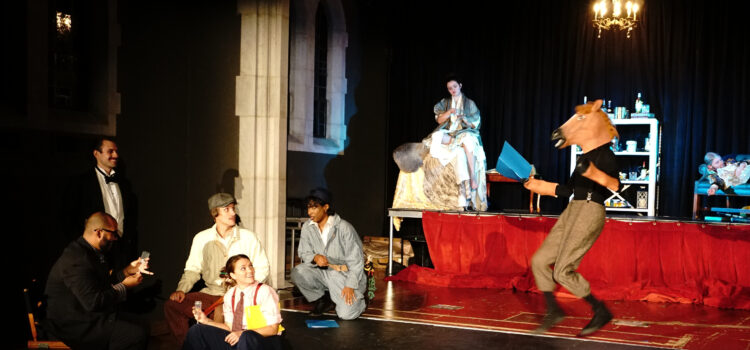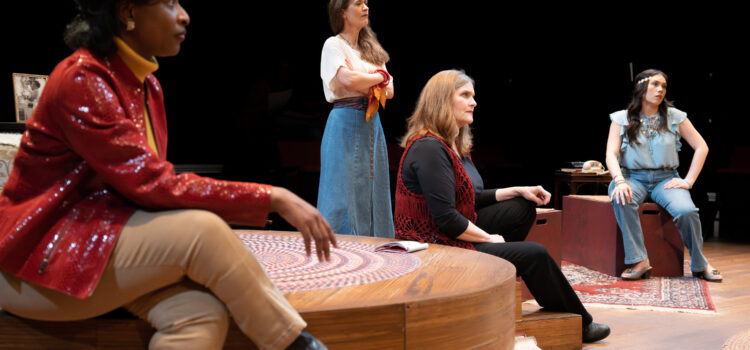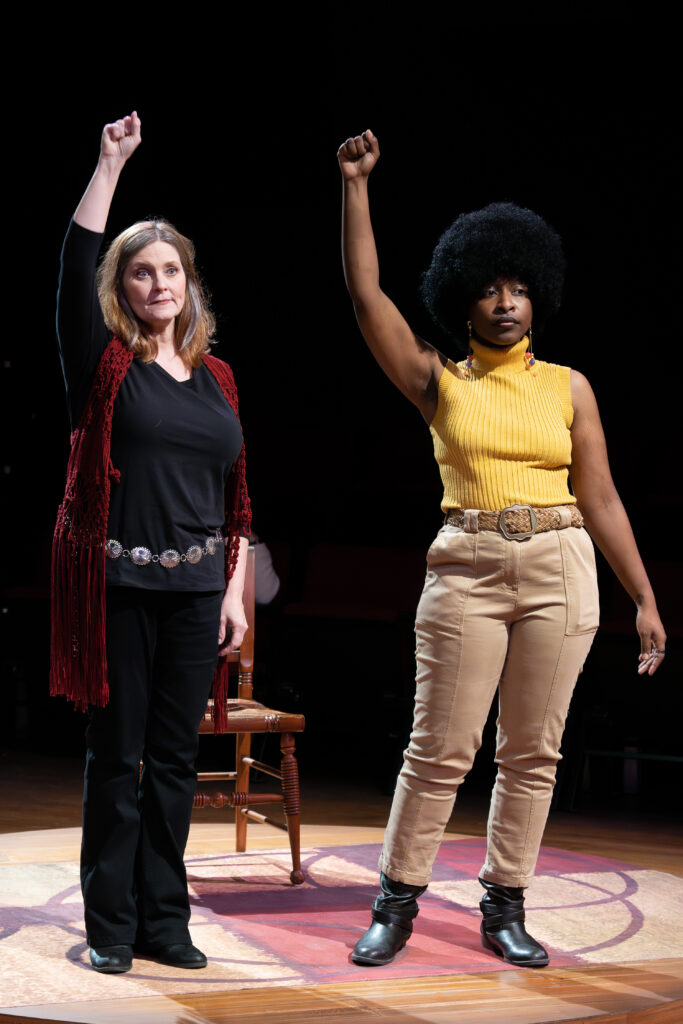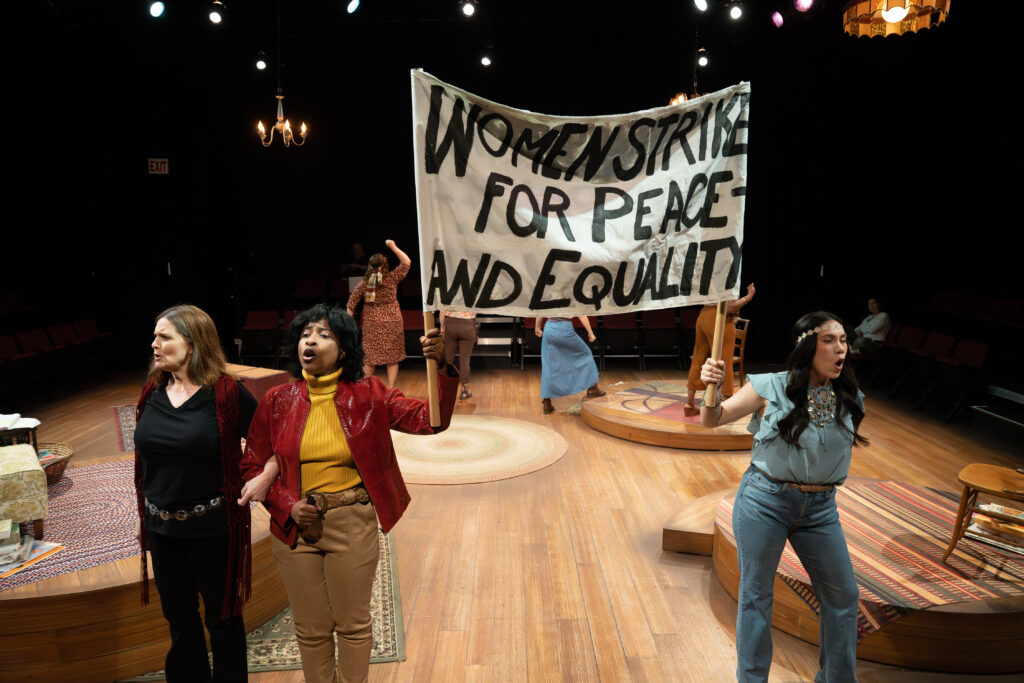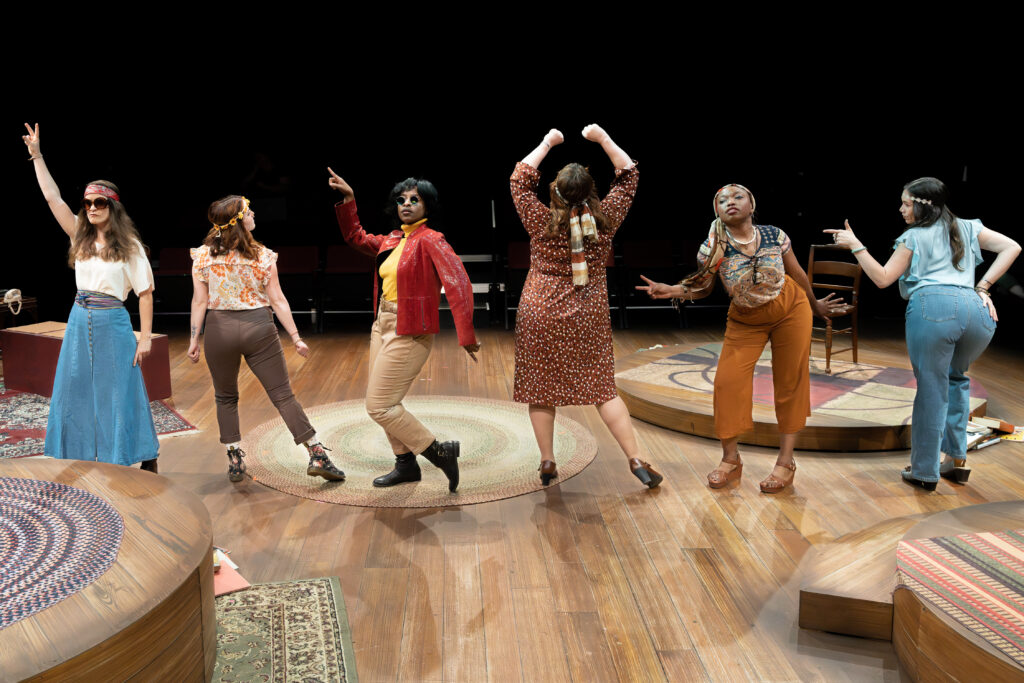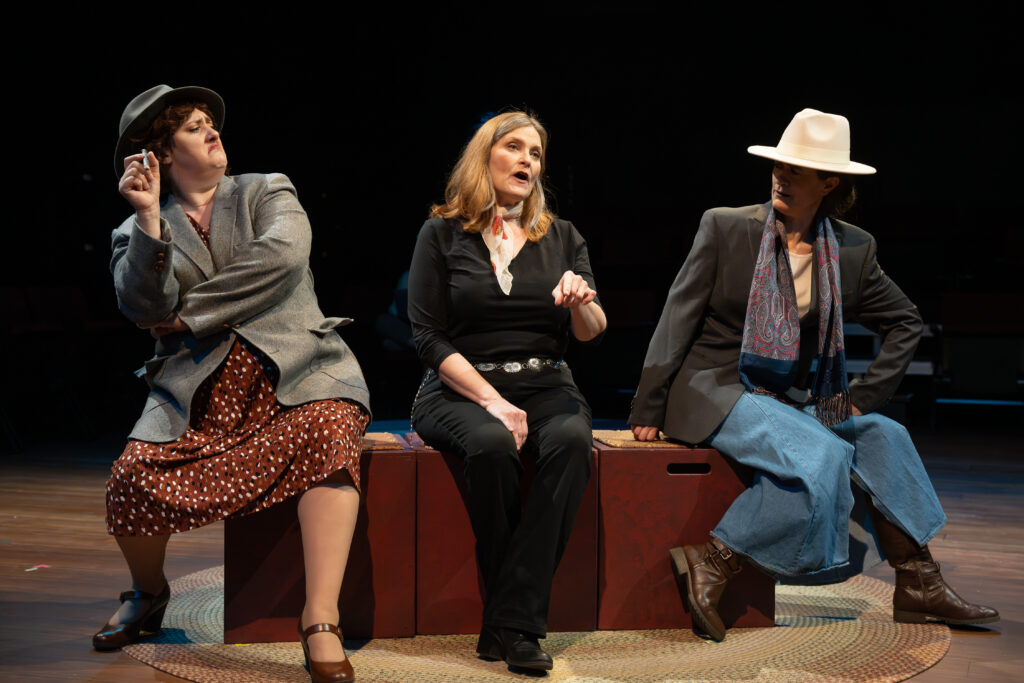By Lynn Venhaus
With full moon magic this week, step into the unique and absurd world created by the imaginative minds at SATE ensemble theatre for “This Palpable Gross Play: A Kind-of Midsummer Night’s Dream.”
It’s Shakespeare flipped inside out, an end-of-summer trifle that follows SATE’s award-winning “Bronte Sister House Party” last year and Equally Represented Arts (aka ERA) with their thoroughly clever “The Residents of Craigslist.”
This ensemble is an appealing, adroit, and gifted group that is fully committed to appearing as if they are self-absorbed, clueless, temperamental, needy, and incompetent actors as the Mechanicals, in addition to feuding royals, and mismatched lovers.
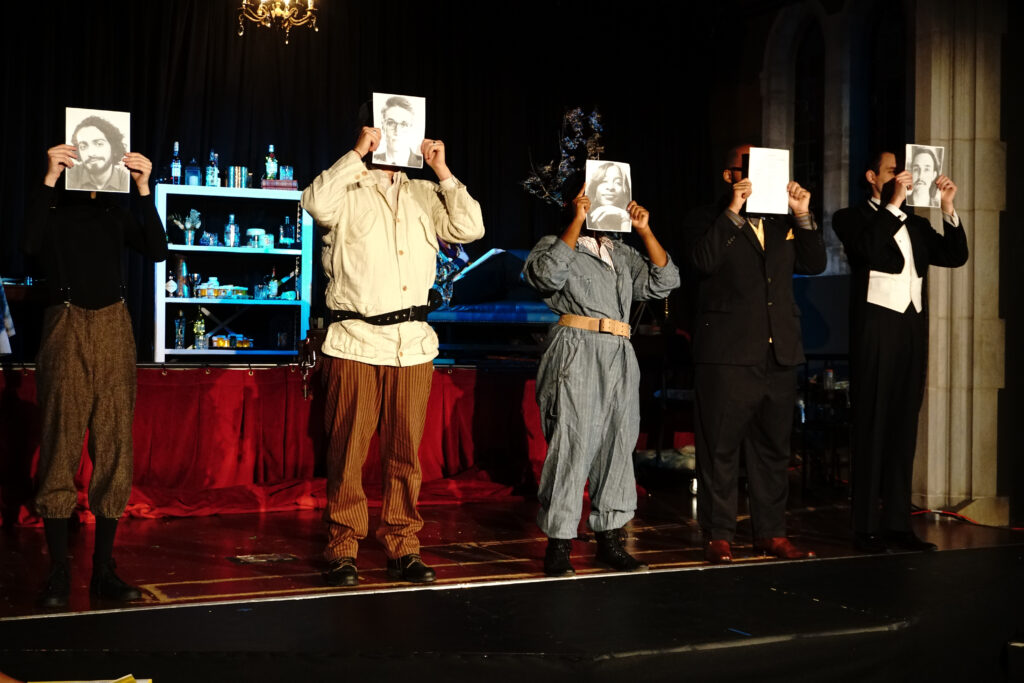
The innovative Lucy Cashion, in a class all by herself, directs here with a touch of whimsy and a focus on the quirky. She is particularly good at dissecting classics and putting her own spin on them, such as “Trash Macbeth” in 2016 for ERA (St. Louis Theater Circle Award for directing) and “Oedipus Apparatus” for SATE in 2017.
She teams up here with the multi-hyphenate Ellie Schwetye, a distinctive writer also good at different takes on Jane Austen (“First Impressions,” St. Louis Theater Circle Award for Best New Play in 2018), who has adapted this version of Shakespeare’s beloved 16th century comedy.
Normally, the play starts with royal wedding planning, gets sidetracked with love potions and mixed-up pairings, and features a troupe of inept actors rehearsing a play as the special occasion entertainment. Instead of being the side hustle, the Mechanicals have the spotlight, and they shine in all their peculiar glory.
So, dive into their world, not knowing where you will go. You may think you know this play, but here, they’re steering the ship into uncharted, yet kinda familiar, waters. And that’s the fun of it.
The Mechanicals are referred to as skilled manual laborers, and others look down on them. But for this amateur troupe, there’s no way to go but up. Kayla Ailee Bush is bellows-mender Francis Flute, Andre Eslamian is weaver Nick Bottom, Anthony Kramer Moser is joiner Snug, Joshua Mayfield is tinker Tom Snout, Ross Rubright is tailor Robin Starveling, and Kristen Strom is carpenter Peter Quince, the director. Strom’s presiding over the circus as if she’s Orson Welles directing the Mercury Theatre.
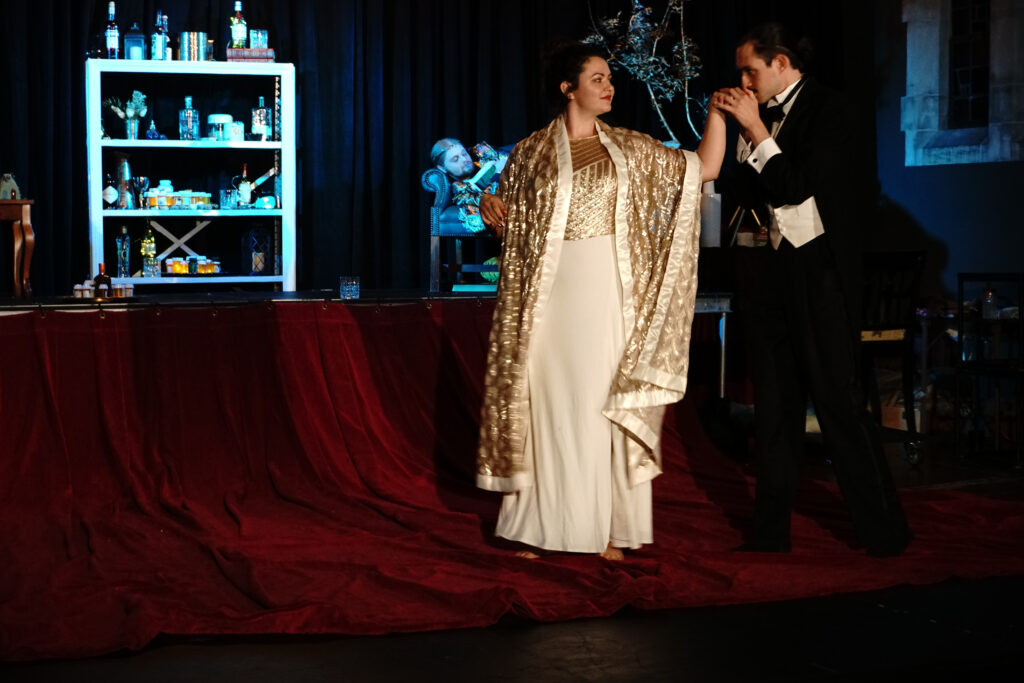
Moser is very funny getting into his lion role, and with the others, their idiosyncrasies emerge as they develop the characters for the tragic love story of “Pyramus and Thisbe,” set in Babylon. Andre Eslamian plays Bottom as an insufferable know-it-all. Joshua Mayfield’s Tom Snout is perturbed about how he’s moved around, and so is Kayla Ailee Bush’s Francis Flute. (The sextet is so bad, the audience thinks it’s a comedy). Master thespians, you know.
Well, they may be delusional, but they are giving it their all as they prepare to mount the play-within-a-play, hopeful of entertaining at Theseus and Hippolyta’s royal wedding. Of course, they question their parts, bicker with castmates and Quince, trying to get the attention they need and ‘deserve.’
Now, in context, we don’t see Theseus and Hippolyta here, but they are the toast of the town, as he is the Duke of Athens and she is the Queen of the Amazons.
I digress.
Puck/Robin Starveling (Ross Rubright), Titania (Victoria Thomas) and Oberon (Spencer Lawton) are outfitted to look like old-timey movie stars of the silent era, extras in “The Great Gatsby,” or maybe Puck is the bartender in “The Shining.”
They have an aristocratic air, and wear Liz Henning’s gorgeous period attire beautifully. As the king and queen of the fairies, Titania and Oberon are estranged and feuding, and Thomas and Lawton make that obvious, as if they are reciting lines in a Noel Coward play.
In another flip, Oberon falls in love with Bottom, who’s now costumed as a donkey. Hee-haw! Eslamian and Lawton display deft physical comedy skills during this turn of events.
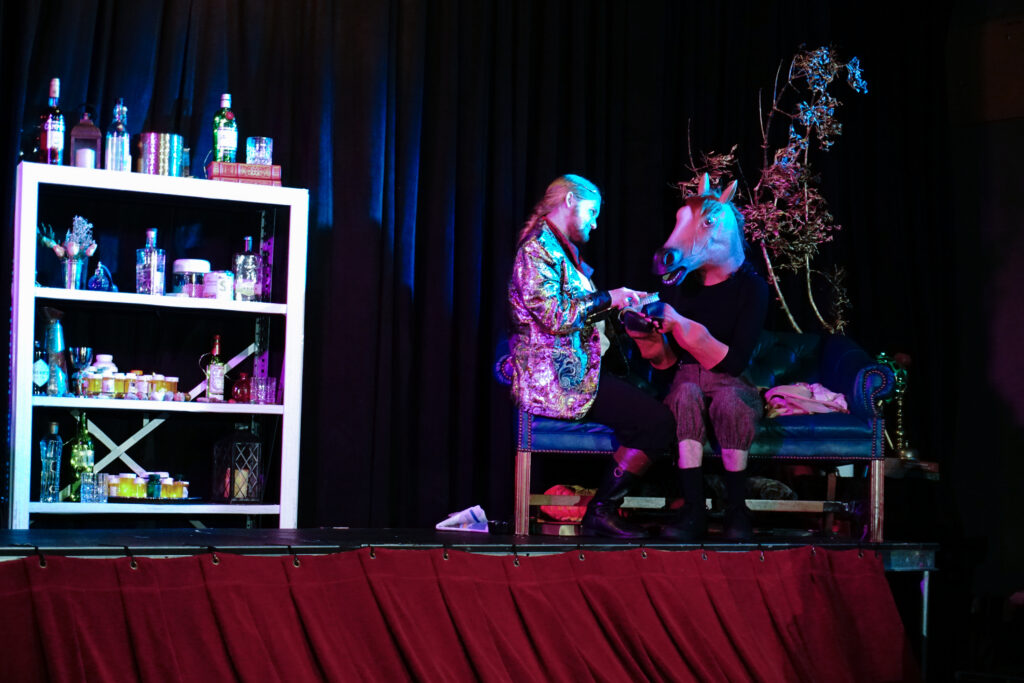
Dapper in tails, Ross Rubright introduces himself as Robin Starveling as he welcomes the audience. The tall Rubright is visually striking, and then he begins his contrasting monologues, as if auditioning, and reads a commercial for Lunesta, a prescription sleep aid, including a long list of side effects. It sets the mischievous mood beautifully.
Rubright may not be sprite-size, but as Puck, he smoothly moves around creating dazed and confused mayhem with his lantern, wafting potion, and magic powers.
That iconic butterfly logo will be referred to several times and its shimmering wings used in another ‘wow’ vision from Henning.
Now the star-crossed lovers make an appearance too, as the cast doubles roles: Hermia (Bush), Lysander (Moser), Helena (Strom), and Dementrius (Mayfield). In Shakespeare’s original, Hermia is in love with Lysander, but her father wants her to marry Demetrius, who is in love with her, but Helena is in love with him. It’s complicated.
The creative team is first-rate, too, with Erik Kuhn’s atmospheric lighting design noteworthy. Joe Taylor’s original music score is a delightful throwback to such ‘30s styles as “Moonlight Serenade” and Cole Porter.
Cashion and Schwetye collaborated on the scenic design – a summer house’s study where Titania and Oberon are ensconced, and use front space for the woodland where rehearsals are staged. Jimmy Bernatowicz, the stage manager, and Rachel Tibbetts, the co-producer, also contributed to the overall experience.
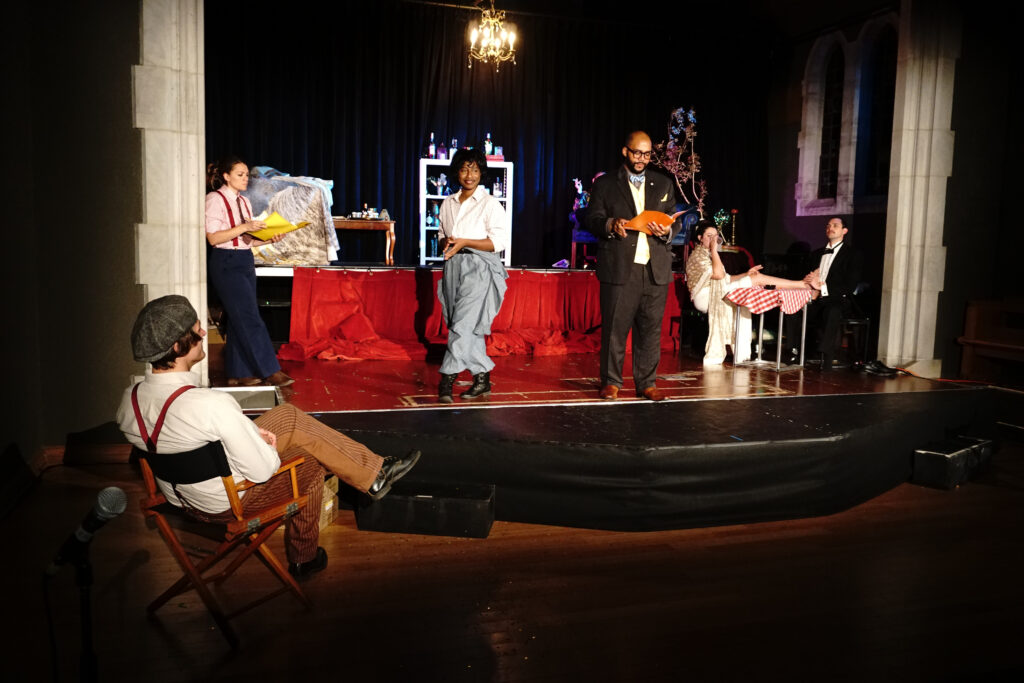
The play has a fantasy quality reminiscent of the 1935 movie, which is mesmerizing in its depiction of the glistening fairies frolicking in the forest created through rudimentary visual effects back then. (The casting is memorable too – James Cagney is Nick Bottom and Mickey Rooney is Puck!)
“This Palpable Gross Play” is tantalizing with its witty take on illusions and theme of metamorphosis. The folly is fun, thanks to the harmonious cast and crew’s efforts. Adventurous theatergoers can applaud their good fortune at seeing a fresh interpretation of an enduring classic.
Note: The script of “This Palpable Gross Play” will also receive productions with Clayton High School and with Prison Performing Arts.
SATE is presenting “This Palpable Gross Play: A Kind-of Midsummer Night’s Dream” Aug. 16 through Sept. 2, with performances Wednesday through Saturday at 8 p.m. at The Chapel, 6238 Alexander Drive. It is 90 minutes without an intermission. Tickets are $25 and can be purchased through Eventbrite. For more information, visit www.satestl.org.
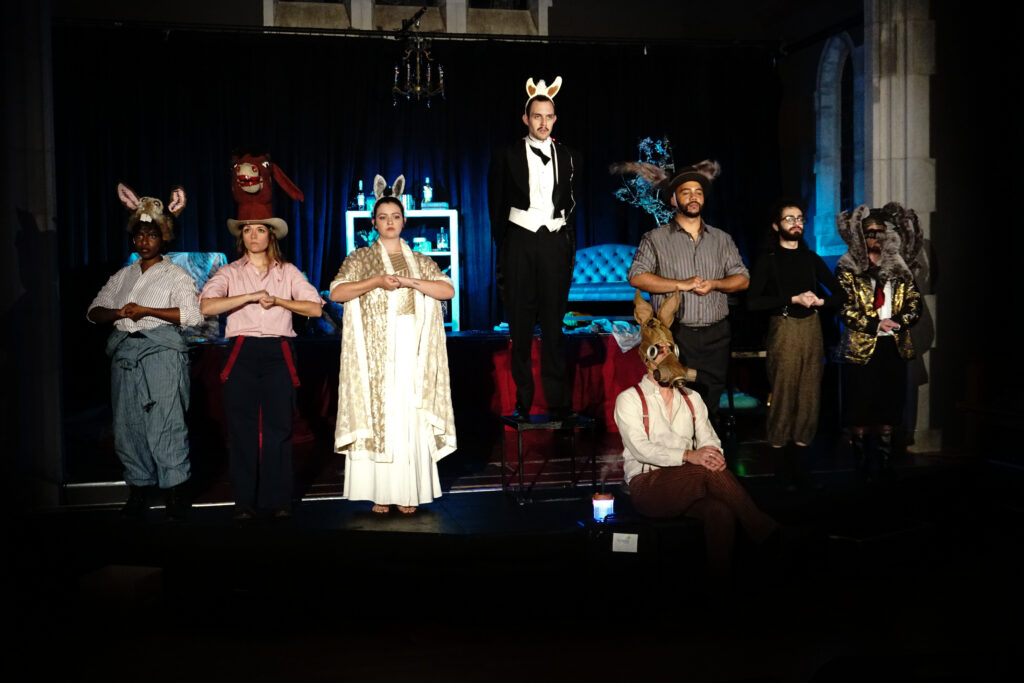

Lynn (Zipfel) Venhaus has had a continuous byline in St. Louis metro region publications since 1978. She writes features and news for Belleville News-Democrat and contributes to St. Louis magazine and other publications.
She is a Rotten Tomatoes-approved film critic, currently reviews films for Webster-Kirkwood Times and KTRS Radio, covers entertainment for PopLifeSTL.com and co-hosts podcast PopLifeSTL.com…Presents.
She is a member of Critics Choice Association, where she serves on the women’s and marketing committees; Alliance of Women Film Journalists; and on the board of the St. Louis Film Critics Association. She is a founding and board member of the St. Louis Theater Circle.
She is retired from teaching journalism/media as an adjunct college instructor.

